Foreign Policy Challenges of Pakistan
Aftab H Wahla
The formulation and implementation of a set of ideas, actions, statements and intentions that governs the behaviour of states while interacting with other states to promote, enhance and secure its national interests can loosely be defined as foreign policy. Formulation of foreign policy is actually a process whereby a state translates its ideologically-, historically- and culturally-driven goals into concrete, specific and purposeful course of action with an exclusive aim to have enabling international environment where diplomats could navigate smoothly and effectively in their pursuit of protecting vital interests of their countries. The execution of effective foreign policy warrants well-delineated and well-hammered-out vision regarding desired outcomes, well-thought-out strategies (diplomatic tactics, coercion, utilization of soft and hard power, etc.) to materialize this vision and optimum utilization of all available resources at the state’s disposal to execute the foreign policy. Succinctly, foreign policy is the identification, prioritization and safeguard of national interests while interacting with other states and organizations at global, regional and sub-regional levels.
Foreign policy of a country is always the reflection of its domestic political circumstances and its geostrategic and geo-economic relevance in international system. The determinants of foreign policy can broadly be divided into domestic and external factors. Historical and cultural tendencies, geography, population, economic development, natural resources, military capabilities, political system, personality and character of leader, political parties and interest groups, press and public opinion and level of advancement in science and technology play a vital role in shaping foreign policy domestically. As for external factors responsible for influencing the freedom and level of manoeuvrability of states, international system, international law, alliances, military capabilities, arms race, international organizations and different non-state actors can be enlisted as the key determinants of foreign policy.
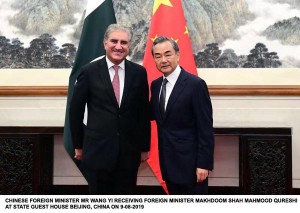 Pakistan has always been treated as strategically, demographically, economically and diplomatically important country, and its role is considered pivotal in maintenance of global and regional peace and security. In this regard, the comments made by General Joseph Votel, former commander of US Central Command, during a briefing before Senate Armed Services Committee on Feb 08, 2019, are worth mentioning as they succinctly underline the significance of Pakistan to the outer world. He termed Pakistan “a crucially vital state for US” as it possesses nuclear weapons and sits at the nexus of Russian, Indian, Chinese, Iranian and US geopolitical interests. Situated at the crossroads of Central, South and East Asia, Pakistan can play determinant role in regional infrastructure connectivity and ensuing economic integration. In addition, the close proximity to the Gulf of Oman and deep seaport Gwadar give Pakistan the geographical leverage to offer shortest route (2600 km as compared to Iran’s 4500 km and Turkey’s 5000 km) to warm water for landlocked energy-rich Central Asian Republics. Pakistan also enjoys the huge untapped demographic and natural resources and the neighbourhood with world’s most populous and fast developing nuclear powers-India and China also confers it the unique geostrategic relevance in the world. Most importantly, sharing of 2250-km long border with Afghanistan and 909-km long border with Iran- the countries occupying central stage in foreign policy of US- has provided Pakistan the unparalleled vista of opportunity to exert extremely critical influence in regional and global affairs.
Pakistan has always been treated as strategically, demographically, economically and diplomatically important country, and its role is considered pivotal in maintenance of global and regional peace and security. In this regard, the comments made by General Joseph Votel, former commander of US Central Command, during a briefing before Senate Armed Services Committee on Feb 08, 2019, are worth mentioning as they succinctly underline the significance of Pakistan to the outer world. He termed Pakistan “a crucially vital state for US” as it possesses nuclear weapons and sits at the nexus of Russian, Indian, Chinese, Iranian and US geopolitical interests. Situated at the crossroads of Central, South and East Asia, Pakistan can play determinant role in regional infrastructure connectivity and ensuing economic integration. In addition, the close proximity to the Gulf of Oman and deep seaport Gwadar give Pakistan the geographical leverage to offer shortest route (2600 km as compared to Iran’s 4500 km and Turkey’s 5000 km) to warm water for landlocked energy-rich Central Asian Republics. Pakistan also enjoys the huge untapped demographic and natural resources and the neighbourhood with world’s most populous and fast developing nuclear powers-India and China also confers it the unique geostrategic relevance in the world. Most importantly, sharing of 2250-km long border with Afghanistan and 909-km long border with Iran- the countries occupying central stage in foreign policy of US- has provided Pakistan the unparalleled vista of opportunity to exert extremely critical influence in regional and global affairs.
It is pertinent to discuss here the challenges the foreign policy makers of Pakistan are facing in order to have proper understanding of our status in the current world order.
Notwithstanding that internationalization of Kashmir dispute has been the major plank of our foreign policy since independence, preplanned and well-anticipated unilateral decision on the part of India to scrap the special status of Jammu and Kashmir state through abrogation of Indian constitution’s Article 370 (that authorizes the J&K state to enjoy the autonomous status within Indian union) and Article 35A (that forbids non-resident Kashmiris to buy properties in Kashmir) is proving a litmus test for our diplomatic clout. As per expectations, Pakistan responded to 5th August decision sharply and angrily with downgrading of diplomatic ties, sending the Indian ambassador back, suspending bilateral trade and withdrawing Pakistan Ambassador-designate Moin-ul-Haq. PM Imran Khan addressed the joint session of the parliament and a specially-convened session of the Constituent Assembly of Azad Jammu and Kashmir. He likened Modi’s domestic and foreign policies to European fascist movement of 1930s and urged the world to stop repeating the infamous appeasement policy that resulted into the devastating Second World War. The latest crisis and the response thereof from major capitals and multilateral global institutions like the UN would determine whether Indian policy of isolating Pakistan has succeeded or not, and would also judge the effectiveness of our diplomatic outreach to counter Indian diplomatic maneouvrings in that regard.
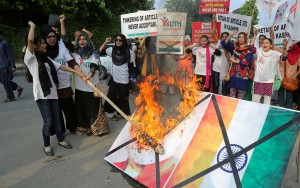 Nevertheless, Pakistan can fight the latest Indian move on legal, diplomatic and political fronts. Legally, Pakistan’s position is strong on many grounds. Unilateral revocation of Article 370 via a presidential decree is the violation of Indian constitution as the said article can only be annulled if Indian president acts on the recommendations of A&J assembly – Article 370(3) which reads: “Notwithstanding anything in the foregoing provisions of this article, the President may, by public notification, declare that this article shall cease to be operative or shall be operative only with such exceptions and modifications and from such date as he may specify: Provided that the recommendation of the Constituent Assembly of the State referred to in clause (2) shall be necessary before the President issues such a notification.”
Nevertheless, Pakistan can fight the latest Indian move on legal, diplomatic and political fronts. Legally, Pakistan’s position is strong on many grounds. Unilateral revocation of Article 370 via a presidential decree is the violation of Indian constitution as the said article can only be annulled if Indian president acts on the recommendations of A&J assembly – Article 370(3) which reads: “Notwithstanding anything in the foregoing provisions of this article, the President may, by public notification, declare that this article shall cease to be operative or shall be operative only with such exceptions and modifications and from such date as he may specify: Provided that the recommendation of the Constituent Assembly of the State referred to in clause (2) shall be necessary before the President issues such a notification.”
Not to speak of constituent assembly (that ceased to exist on January 26, 1957), the Jammu and Kashmir state does not even have a legislative assembly, let alone the constituent assembly. In addition, the Indian decision to bifurcate J&K into two union territories – Ladakh and J&K, is violation of at least 11 UN Security Council resolutions, and it has also rendered Simla Accord (1972) and Lahore Declaration (1999) ineffective and dysfunctional. As far as the question ‘how Pakistan can effectively counter the Indian move?’ is concerned, we have multiple legal and diplomatic recourses to follow. In this regard, projection of Kashmir, owing to its current situation, as a nuclear flashpoint that may threaten international peace and security could force UN Secretary General to seek UNSC attention under Article 99 of the UN charter. The informal consultative UNSC huddle which took place on August 16, though failed to generate consensus to hold formal UNSC meeting, it did internationalize the dispute and has also highlighted the UN-designated disputed nature of Kashmir.
India’s decision to revoke Article 370, which was inserted in its constitution in 1952 to legalize the so-called Instrument of Accession, has legally made its forces, an occupying army. Now any action of killing Kashmiris under the pretext of quelling protests would constitute a punishable crime which means it can be pursued in International Criminal Court against Modi-Shah-Doval troika. In this connection, Pakistan can bring on genocide, war crimes or crimes against humanity as charges against India. Though India has neither signed nor ratified Rome Statute due to ongoing conflict in Kashmir and its northeast, the resolution adopted under Chapter 6 (Article 37) of UN Charter by UNSC can initiate ICC investigation. Being an occupant country, any attempt on the part of Indian authorities to change Kashmir’s demographics would be considered the violation of Geneva Conventions, and Pakistan will again knock at the door of ICC to further pressure India. India’s blatant refusal to accept two consecutive reports by UN Human Right Council (UNHRC) wherein the Council documented and reported grave human rights violation by Indian armed forces in IoK, and much-feared indiscriminate and disproportionate use of power to crush the looming uprising in Kashmir could be made the basis for approaching UNHRC to establish a Commission of Inquiry (COI) to conduct comprehensive investigation into the matter. UNHRC’s report also sought the same, but strategic interests outweighed the moral considerations of member countries. In addition to the hectic, aggressive and high-profile diplomacy, the options like widespread public protests and rallies, ratcheting up reversible tensions along the LoC and working boundary, engaging Kashmiri diaspora for sustaining the Kashmir resistance and reiteration of unwavering and unflinching support by our army top brass should be exploited systematically and strategically. Though most of our diplomatic efforts may fail, our highly visible and committed diplomatic efforts would definitely be a morale-booster for the freedom movement in Kashmir.
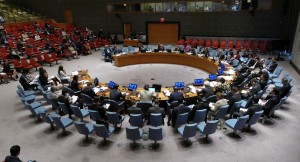 Protection of security interests in Afghanistan is also a major concern for Pakistan’s foreign policy makers. Though our security agencies have long abandoned strategic-depth-like military doctrines, our intelligence agencies invested their considerable human and material resources in maintaining some sort of influence over Taliban so as to deprive India of logistics for fanning insurgency in tribal areas and the Balochistan province. Though Pakistan, initially, had to spend handsome amount of diplomatic capital in maintaining clandestine contacts with Afghan insurgents, the investment is paying off now in the form of expedited Pakistan-supported intra-Afghan peace process to seek politically-negotiated resolution of the Afghan dispute. At this critical juncture of time when the US-Taliban peace process has entered a decisive phase, the major capitals of the world are fully convinced that it is only Pakistan that can bring Taliban to table so as to discuss the broader contours of post-withdrawal political setup. To the frustration of India, Pakistan is gaining diplomatic more clout due to an apt strategic use of Afghan card, and virtually eliminating the Indian role in peace process. It, no doubt, bodes ill for India as very presence of Taliban in power corridors of Kabul would proactively squeeze space for it to exploit Afghan land for orchestrating anti-Pakistan activities. Now it is high time for our Foreign Office to draw up foreign policy in a way that ensures promotion and security of our geo-economic and geo-strategic interests side by side the resolution of the Afghanistan dispute. One of the immediate uses of this newly-found diplomatic relevance is to use it as bargaining chip to resolve Kashmir once and for all as POTUS had offered to mediate it. Therefore, it is up to the Foreign Office to exploit this once-in-a-decade opportunity to resolve the lingering issue that is becoming more and more volatile and combustible.
Protection of security interests in Afghanistan is also a major concern for Pakistan’s foreign policy makers. Though our security agencies have long abandoned strategic-depth-like military doctrines, our intelligence agencies invested their considerable human and material resources in maintaining some sort of influence over Taliban so as to deprive India of logistics for fanning insurgency in tribal areas and the Balochistan province. Though Pakistan, initially, had to spend handsome amount of diplomatic capital in maintaining clandestine contacts with Afghan insurgents, the investment is paying off now in the form of expedited Pakistan-supported intra-Afghan peace process to seek politically-negotiated resolution of the Afghan dispute. At this critical juncture of time when the US-Taliban peace process has entered a decisive phase, the major capitals of the world are fully convinced that it is only Pakistan that can bring Taliban to table so as to discuss the broader contours of post-withdrawal political setup. To the frustration of India, Pakistan is gaining diplomatic more clout due to an apt strategic use of Afghan card, and virtually eliminating the Indian role in peace process. It, no doubt, bodes ill for India as very presence of Taliban in power corridors of Kabul would proactively squeeze space for it to exploit Afghan land for orchestrating anti-Pakistan activities. Now it is high time for our Foreign Office to draw up foreign policy in a way that ensures promotion and security of our geo-economic and geo-strategic interests side by side the resolution of the Afghanistan dispute. One of the immediate uses of this newly-found diplomatic relevance is to use it as bargaining chip to resolve Kashmir once and for all as POTUS had offered to mediate it. Therefore, it is up to the Foreign Office to exploit this once-in-a-decade opportunity to resolve the lingering issue that is becoming more and more volatile and combustible.
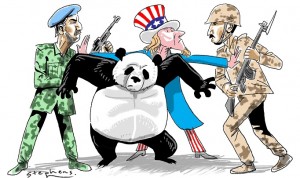 Multilateral diplomacy, which was a result of highly-ambiguous and reactionary dealing with international political and legal institutions, has long been the weakest link in our foreign policy chain. Financial Action Task Force (FATF) is one such example where our Foreign Office failed to convince even our allies, and resultantly, our AML/CTF regimes were declared systematically deficit in June 2018. Now that FATF’s February and June plenary sessions have proved equally embarrassing, and Pakistan was warned to demonstrate full-compliance with action plan and FATF recommendations by October, otherwise all capital inflows including IMF-financing would be severely restrained, the huge challenge lies ahead for our Foreign Office. Pakistan not only will have to avoid blacklisting (that requires support of at least 3 members), but the upgradation to the white list has also becoming seemingly mandatory to smoothly navigate through the conditionalities imposed by IMF.
Multilateral diplomacy, which was a result of highly-ambiguous and reactionary dealing with international political and legal institutions, has long been the weakest link in our foreign policy chain. Financial Action Task Force (FATF) is one such example where our Foreign Office failed to convince even our allies, and resultantly, our AML/CTF regimes were declared systematically deficit in June 2018. Now that FATF’s February and June plenary sessions have proved equally embarrassing, and Pakistan was warned to demonstrate full-compliance with action plan and FATF recommendations by October, otherwise all capital inflows including IMF-financing would be severely restrained, the huge challenge lies ahead for our Foreign Office. Pakistan not only will have to avoid blacklisting (that requires support of at least 3 members), but the upgradation to the white list has also becoming seemingly mandatory to smoothly navigate through the conditionalities imposed by IMF.
Pakistan’s experience with international legal institutions has been not-so encouraging. If we talk about International Court of Justice, the principal judicial organ of the United Nations, Pakistan has, till now, instituted four proceedings in ICJ against India: first, we challenged the ICJ’s jurisdiction over its review power with respect to decision taken by Council of International Civil Aviation regarding Indian suspension of overflight of Pakistan planes over Indian territory, our application was rejected; second, Pakistan asked the ICJ in 1973 to stop India from handing over 195 Pakistani PoWs to Bangladesh who were feared to face charges of genocide and war against humanity, India objected the jurisdiction of ICJ and proceeding was initiated, later on, Pakistan withdrew the case pretending that it wanted to resolve the issue bilaterally; Pakistan again knocked at the door of ICJ over downing of Pakistan aircraft by India in 1999 that resulted into killing of 16 people on board, India challenged the maintainability of case and ICJ dismissed Pakistan’s position on the ground that it lacked jurisdiction in bilateral dispute; Pakistan’s latest legal battle over Kulbhushan Jadhav’s detention, trial and sentence also did not produce favourable outcomes for Pakistan, though ICJ stopped short of instructing Pakistan to release the captured Indian spy (the only aspect of ICJ’s 17th July decision in our favour), ICJ not only rejected Pakistan’s application regarding court’s jurisdiction, it also accepted Indian position that Pakistan acted in the breach of Article 36 of Vienna Convention that deals with consular access and asked Pakistan as reparation to conduct effective review and reconsideration of conviction and sentencing of Kulbhushan Jadhav. It also ordered continued stay on execution as indispensable condition for effective review of the conviction. The only time when ICJ accepted our legal position was instituting proceedings by Marshal Inlands in 2014 over Pakistan’s unfulfilment of its obligations regarding nuclear disarmament and nuclear arms race. Pakistan rejected the jurisdiction of ICJ, which it accepted and the case was dismissed. This brief overview of our lego-diplomatic history does indicate the institutional incapacities in our Foreign Office regarding handling of legal proceedings at International legal fora. We cannot hide our failure under the political nature of these decisions. In a recent verdict in Reko Diq case, the International Centre For Settlement of Investment Disputes, an organ of the World Bank Group, awarded a whopping $5.97 billion penalty against Pakistan, which also speaks volume about institutional lethargy. The poor performance on legal front does demand some introspection and rectification to avoid diplomatic embarrassment in future.
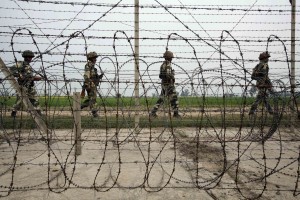
Foreign policy of any country is always the external aspect of its national policy; it covers the whole gamut of international, regional and neighbourhood developments, and reflects the soft and hard power of the nation. IMF program conditionalities, a raft of FATF-recommended security and financial policy actions, socioeconomic constraints and institutional incapacities have squeezed policy options for Pakistan. Given the potentially existential threats in security and financial realms, Pakistan’s Foreign Office pressingly needs to formulate proactive and well-calibrated foreign policy. In this regard, budgetary allocation for lobbying in major capitals, logistic and financial support for establishment of well-resourced specialized think tanks in order to ensure quality research, analysis and advocacy for informed decision making, institutional capacity building of Foreign Service Academy, participatory and inclusive political set up including empowerment of standing committee on foreign affairs, diplomatic outreach programs to engage Europe- and USA-based diaspora, intensification in bilateral ties through broadening trade volume, exploring new lands of opportunity like establishment of diplomatic ties with African countries in order to seek new markets, maintenance of neutrality in regional and global rivalries, institutionalized mechanism for frequent consultation with ex-ambassadors and ex-foreign secretaries, sustained synergy between civilian and military institutions, appointment of career diplomats on key assignments, active role in UN Peacemaking and Peace-building initiatives, strategic use of international electronic and print media by our embassies for projection of soft image of Pakistan and emphasis upon financial and trade diplomacy rather security-oriented diplomacy would help FO to come up with coherent, well-thought out, inclusive and responsive foreign policy that would protect and promote the objectives and interests of Pakistan.
 Jahangir's World Times First Comprehensive Magazine for students/teachers of competitive exams and general readers as well.
Jahangir's World Times First Comprehensive Magazine for students/teachers of competitive exams and general readers as well.



